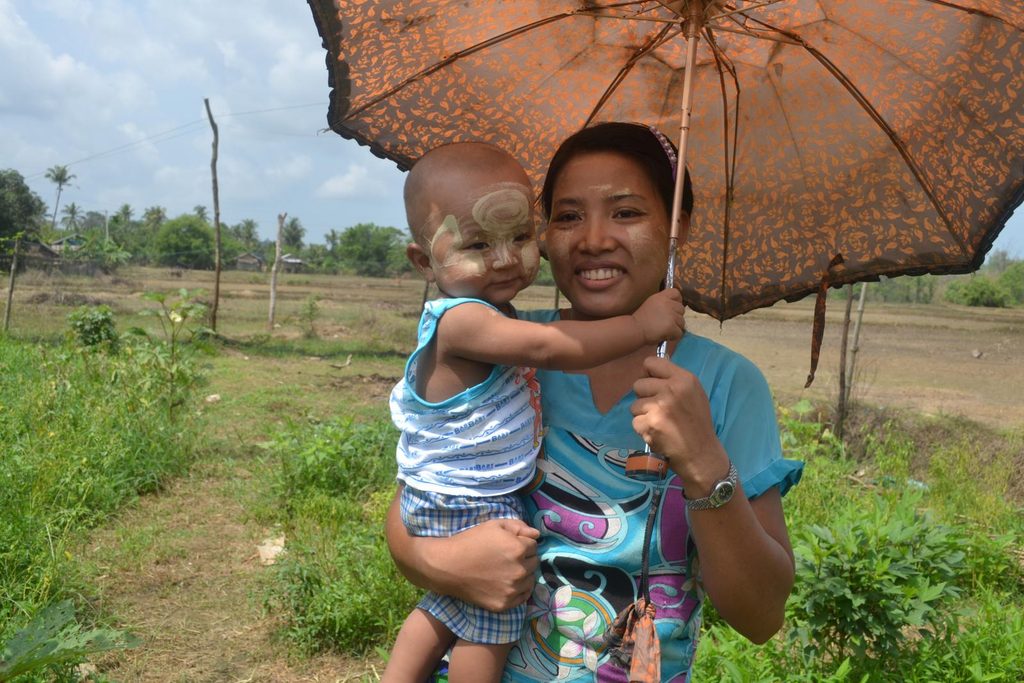Nutrition volunteer Khin Khin Htwe is supporting women in her community to provide their children with healthy, nourishing food.

Located by the Bay of Bengal, Rakhine State has some of the highest levels of malnutrition in Myanmar. A total of 50% of children are stunted, 38% are underweight and 11% suffer from acute malnutrition. This means that just 1% of children in the state are receiving adequate nutrition.
Khin Khin Htwe is a quiet mother of 2 who has always lived here. She is unsurprised as babies around her cry, the young ones don’t like being weighed or measured, she explains.
Volunteer health service
In a village cut-off from health services during the monsoon season, Khin Khin Htwe performs a vital service in her community where there’s no doctor and limited health services. She’s a nutrition volunteer and it’s her job to visit mothers after they give birth to ensure they are breastfeeding correctly.
She also leads 8 nutrition groups in her village, where she weighs and measures children up to 2 years of age to identify early signs of malnutrition and work with parents to deal with this straight away. Each month she advises parents on how to cook a healthy and balanced diet for their children.
“I have always been interested in childcare and I want to keep improving my knowledge, so I decided to become a nutrition volunteer,” Khin Khin Htwe explained.
“I did nothing before this project. Now I support 63 women. Thanks to the project, now we know how to weigh and measure children and keep them healthy.”
“Supporting women to breastfeed is the best part of my job,” Khin Khin Htwe explains. “After a child is born, I visit the mother and share my knowledge with her at home. Women have to breastfeed within an hour of birth,” she explains, as this is when babies receive colostrum – a nutrient-rich form of breastmilk that is vital for the health of newborns.
Preventing malnutrition
Just 24% of women in Myanmar breastfeed exclusively for the first 6 months of a child’s life, as recommended by the World Health Organisation.
Khin Khin Htwe is sure this is not the case here. “We tell the mothers to breastfeed their babies as much as the child wants. In this village, all mothers breastfeed their children. After 6 months they start eating some rice and the women continue breastfeeding,” she said.
Laying down on the floor to be measured, the babies don’t look happy. Khin Khin Htwe laughs and explains “The babies almost always cry when we measure them, they are scared. The 3 to 5 year olds are fine because they understand what is happening, and they can stand up.”
The small scare is worth it though, as it helps the volunteers and the parents to keep track of the children’s development.
“If we find a child that is malnourished, I provide one on one counselling with the mothers to encourage them to feed their children more nutritious food. We teach them about the 3 groups of nutritious foods and we support the women to cook for their families based on this, especially the pregnant women,” she said.
“Before, people ate just 2 meals per day, but now they are eating 3. They did not have diversity in their diets but now they are growing and cooking a bigger range of foods.”
Khin Khin Htwe has been a nutrition volunteer for the past year, and received training on performing nutrition assessments, breastfeeding and how to start home gardens, so she can support parents to grow their own, healthy foods.
“I want to keep doing this job for as long as I stay in the village,” she says, and is committed to keeping her nutrition groups running long-term.
The next generation
Khin Khin Htwe’s 9-year-old daughter, Jessimay attends a school across the street from one of her mother’s nutrition meetings. Some days, mother and daughter are just metres apart but both are working towards a common goal of keeping children in their village healthy.
Jessimay is a member of her school water and sanitation (WASH) team, and like her mother, is sharing her knowledge widely. The group regularly perform handwashing demonstrations at school and sing a song that helps children to wash their hands correctly.
“While I’ve been a member of the school WASH team I’ve learnt when we should wash our hands each day. We need to wash them before and after eating and after using the toilet. The best part about being in the WASH team is being able to share my knowledge with my friends,” she said.
Plan International Myanmar’s Nutrition and WASH programme is currently working in 7 communities in Taungup, Rakhine State with support from Plan International Germany.
Categories: Early childhood development


